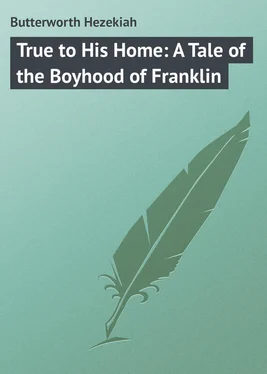Hezekiah Butterworth - True to His Home - A Tale of the Boyhood of Franklin
Здесь есть возможность читать онлайн «Hezekiah Butterworth - True to His Home - A Tale of the Boyhood of Franklin» — ознакомительный отрывок электронной книги совершенно бесплатно, а после прочтения отрывка купить полную версию. В некоторых случаях можно слушать аудио, скачать через торрент в формате fb2 и присутствует краткое содержание. Жанр: foreign_prose, foreign_language, на английском языке. Описание произведения, (предисловие) а так же отзывы посетителей доступны на портале библиотеки ЛибКат.
- Название:True to His Home: A Tale of the Boyhood of Franklin
- Автор:
- Жанр:
- Год:неизвестен
- ISBN:нет данных
- Рейтинг книги:4 / 5. Голосов: 1
-
Избранное:Добавить в избранное
- Отзывы:
-
Ваша оценка:
- 80
- 1
- 2
- 3
- 4
- 5
True to His Home: A Tale of the Boyhood of Franklin: краткое содержание, описание и аннотация
Предлагаем к чтению аннотацию, описание, краткое содержание или предисловие (зависит от того, что написал сам автор книги «True to His Home: A Tale of the Boyhood of Franklin»). Если вы не нашли необходимую информацию о книге — напишите в комментариях, мы постараемся отыскать её.
True to His Home: A Tale of the Boyhood of Franklin — читать онлайн ознакомительный отрывок
Ниже представлен текст книги, разбитый по страницам. Система сохранения места последней прочитанной страницы, позволяет с удобством читать онлайн бесплатно книгу «True to His Home: A Tale of the Boyhood of Franklin», без необходимости каждый раз заново искать на чём Вы остановились. Поставьте закладку, и сможете в любой момент перейти на страницу, на которой закончили чтение.
Интервал:
Закладка:
Butterworth Hezekiah
True to His Home: A Tale of the Boyhood of Franklin
The noblest question in the world is, What good may I do in it?
PREFACE
This volume is an historical fiction, but the plan of it was suggested by biography, and is made to include the most interesting and picturesque episodes in the home side of the life of Benjamin Franklin, so as to form a connected narrative or picture of his public life.
I have written no book with a deeper sympathy with my subject, for, although fiction, the story very truthfully shows that the good intentions of a life which has seemed to fail do not die, but live in others whom they inspire. Uncle Benjamin Franklin, "the poet," who was something of a philosopher, and whose visions all seemed to end in disappointment, deeply influenced his nephew and godson, Benjamin Franklin, whom he morally educated to become what he himself had failed to be.
The conduct of Josiah Franklin, the father of Benjamin Franklin, in comforting his poor old brother in England by naming his fifteenth child for him, and making him his godfather, is a touching instance of family affection, to the memory of which the statesman was always true.
Uncle Benjamin Franklin had a library of pamphlets that was very dear to him, for in the margins of the leaves he had placed the choicest thoughts of his life amid great political events. He was very poor, and he sold his library in his old age; we may reasonably suppose that he parted with it among other effects to get money to come to America, that he might give his influence to "Little Ben," after his brother had remembered him in his desolation by giving his name to the boy. The finding of these pamphlets in London fifty years after the old man was compelled to sell them was regarded by Benjamin Franklin as one of the most singular events of his remarkable life.
Mr. Parton, in his Life of Franklin, thus alludes to the circumstance:
A strange occurrence brought to the mind of Franklin, in 1771, a vivid recollection of his childhood. A dealer in old books, whose shop he sometimes visited, called his attention one day to a collection of pamphlets, bound in thirty volumes, dating from the Restoration to 1715. The dealer offered them to Franklin, as he said, because many of the subjects of the pamphlets were such as usually interested him. Upon examining the collection, he found that one of the blank leaves of each volume contained a catalogue of its contents, and the price each pamphlet had cost; there were notes and comments also in the margin of several of the pieces. A closer scrutiny revealed that the handwriting was that of his Uncle Benjamin, the rhyming friend and counselor of his childhood. Other circumstances combined with this surprising fact to prove that the collection had been made by his uncle, who had probably sold it when he emigrated to America, fifty-six years before. Franklin bought the volumes, and gave an account of the circumstance to his Uncle Benjamin's son, who still lived and flourished in Boston. "The oddity is," he wrote, "that the bookseller, who could suspect nothing of any relation between me and the collector, should happen to make me the offer of them."
It may please the reader to know that "Mr. Calamity" was suggested by a real character, and that the incidents in the life of "Jenny," Franklin's favorite sister, are true in spirit and largely in detail. It would have been more artistic to have had Franklin discover Uncle Benjamin's "pamphlets" later in life, but this would have been, while allowable, unhistoric fiction.
Says one of the greatest critics ever born in America, in speaking of the humble birth of Franklin:
That little baby, humbly cradled, has turned out to be the greatest man that America ever bore in her bosom or set eyes upon. Beyond all question, as I think, Benjamin Franklin had the largest mind that has shone on this side of the sea, widest in its comprehension, most deep-looking, thoughtful, far-seeing, the most original and creative child of the New World.
For the last four generations no man has shed such copious good influence on America, nor added so much new truth to popular knowledge; none has so skillfully organized its ideals into institutions; none has so powerfully and wisely directed the nation's conduct and advanced its welfare in so many respects. No man has so strong a hold on the habits or the manners of the people.
"The principal question in life is, What good can I do in the world?" says Franklin. He learned to ask this question in his home in "beloved Boston." It was his purpose to answer this all-important question after the lessons that he had received in his early home, to which his heart remained true through all his marvelous career.
This is the seventh volume of the Creators of Liberty Series of books of historical fiction, based for the most part on real events, in the purpose of presenting biography in picture.
The former volumes of this series of books have been very kindly received by the public, and none of them more generously than the last volume, The Wampum Belt. For this the writer is very grateful, for he is a thorough believer in story-telling education, on the Pestalozzi and Froebel principle that "life must be taught from life," or from the highest ideals of beneficent character.
H. B.28 Worcester Street, Boston, Mass., June, 1897 .
CHAPTER I.
THE FIRST DAY
It was the Sunday morning of the 6th of January, 1706 (January 17th, old style), when a baby first saw the light in a poor tallow chandler's house on Milk Street, nearly opposite the Old South Church, Boston. The little stranger came into a large and growing family, of whom at a later period he might sometimes have seen thirteen children sit down at the table to very hard and simple fare.
"A baby is nothing new in this family," said Josiah Franklin, the father. "This is the fifteenth. Let me take it over to the church and have it christened this very day. There should be no time lost in christening. What say you, friends all? It is a likely boy, and it is best to start him right in life at once."
"People do not often have their children christened in church on the day of birth," said a lusty neighbor, "though if a child seems likely to die it might be christened on the day of its birth at home."
"This child does not seem likely to die," said the happy tallow chandler. "I will go and see the parson, and if he does not object I will give the child to the Lord on this January day, and if he should come to anything he will have occasion to remember that I thought of the highest duty that I owed him when he first opened his eyes to the light."
The smiling and enthusiastic tallow chandler went to see the parson, and then returned to his home.
"Abiah," he said to his wife, "I am going to have the child christened. What shall his name be?"
Josiah Franklin, the chandler, who had emigrated to Boston town that he might enjoy religious freedom, had left a brother in England, who was an honest, kindly, large-hearted man, and "a poet."
"How would Benjamin do?" he continued; "brother's name. Benjamin is a family name, and a good one. Benjamin of old, into whose sack Joseph put the silver cup, was a right kind of a man. What do you say, Abiah Folger?"
"Benjamin is a good name, and a name lasts for life. But your brother Benjamin has not succeeded very well in his many undertakings."
"No, but in all his losses he has never lost his good name. His honor has shown over all. 'A good name is rather to be chosen than great riches, and loving favor rather than silver or gold.' A man may get riches and yet be poor. It is he that seeks the welfare of others more than wealth for himself that lives for the things that are best."
Читать дальшеИнтервал:
Закладка:
Похожие книги на «True to His Home: A Tale of the Boyhood of Franklin»
Представляем Вашему вниманию похожие книги на «True to His Home: A Tale of the Boyhood of Franklin» списком для выбора. Мы отобрали схожую по названию и смыслу литературу в надежде предоставить читателям больше вариантов отыскать новые, интересные, ещё непрочитанные произведения.
Обсуждение, отзывы о книге «True to His Home: A Tale of the Boyhood of Franklin» и просто собственные мнения читателей. Оставьте ваши комментарии, напишите, что Вы думаете о произведении, его смысле или главных героях. Укажите что конкретно понравилось, а что нет, и почему Вы так считаете.












